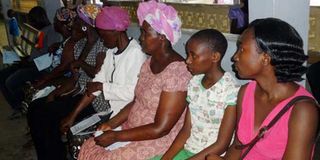Mombasa's Owino Uhuru slum residents get treatment for lead poisoning

Victims of suspected lead poison queue for blood sample testing at Port Reitz Hospital in Mombasa following a county government directive that all residents of Owino Uhuru slum be tested and treated.
Fifteen people from Owino Uhuru slum in Mombasa who tested positive for lead poisoning have started receiving treatment at the Port Reitz District Hospital.
This follows a directive by Governor Hassan Joho that affected residents be treated free of charge.
Tests done by Lancet Kenya targeting an initial 55 people, found 15 to be in need of treatment.
Eleven of the 15 were found to be harmed to “levels compatible with poisoning”, three of them having high levels of toxification, while the rest showed mild effects, said Lancet Kenya pathologist Ahmed Kalebi.
Dr Kalebi said the metal, which is classified as heavy, has diverse effects and its manifestation was not uniform in all people.
EVEN LOW LEVELS HARMFUL
Though it decreases in the body with time, even low levels were harmful, he said.
“If the factory was closed more than six months or a year ago, lead levels in the residents may have reduced by half.
“It, therefore, needs continuous treatment.
“The medication displaces the lead from the body and collects it to the kidney for excretion through urine,” said the expert.
The tests started on Thursday and a special ward has been set aside for the patients at the hospital.
“The county has moved to give symptomatic therapy by administering calcium, iron and zinc as we try to consolidate a list of the affected.
“The immediate response is to improve the level of blood in the patients and facilitate bone formation in children,” County Health Executive Binti Omar said on Saturday at the hospital, during the treatment of the 15.




